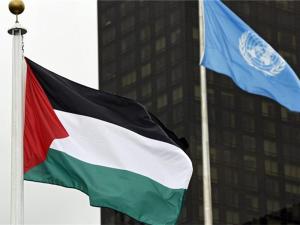
Palestine at the UN
The adoption of United Nations (UN) Security Council Resolution 2334 on December 23, 2016 has elicited furious reactions from Israel and its allies in the U.S. Congress and media. Resolution 2334’s adoption came as a result of a U.S. abstention on the vote for the resolution, which “Reaffirms that the establishment by Israel of settlements in the Palestinian territory occupied since 1967, including East Jerusalem, has no legal validity and constitutes a flagrant violation under international law and a major obstacle to the achievement of the two-State solution and a just, lasting and comprehensive peace … [and r]eiterates its demand that Israel immediately and completely cease all settlement activities in the occupied Palestinian territory, including East Jerusalem, and that it fully respect all of its legal obligations in this regard…”
The Israeli government has promised to disregard the resolution and continues to build illegal settlements in the occupied West Bank. Meanwhile, in the United States, the U.S. House and Senate have issued condemnations of the American abstention, and are now considering legislation that is highly critical of Resolution 2334, and that may reduce U.S. funding for the U.N. unless 2334 is repealed. President-elect Donald J. Trump has appointed an ambassador to Israel who is a financial supporter of the settlement venture (as is the family foundation of Jared Kushner, Trump’s son in law and advisor on Middle East matters) and encourages a renewed effort to relocate the U.S. embassy from Tel Aviv to Jerusalem – a move that violates international law and has already provoked strong Palestinian opposition.
Missing from this brief overview, however, is the role of the UN in the Palestinian-Israeli conflict. Analysts, media pundits, and lobbyists often appear to have forgotten that the question of Palestine predates the establishment of the UN. Lacking is a comprehensive understanding of the myriad ways that the UN and its affiliate agencies have worked to redress Palestinian grievances, as well as an awareness of the many roadblocks and challenges it has thrown up to Palestinian needs and demands.
Most people in the United States are far more likely to hear accusations that the UN is an anti-Semitic organization and that the United States has betrayed Israel. Yet, as this month’s Special Focus, “Palestine at the United Nations,” reveals, Resolution 2334’s passage, and the subsequent international reactions – including a speech by U.S. Secretary of State John Kerry on Middle East peace – fall far short of guaranteeing basic rights, equality, and justice to the Palestinian people. Rather, the question of Palestine has been profoundly defined by UN gridlock resulting from U.S. vetoes, as well as the UN’s inability to enforce a host of resolutions that date back to 1948. Will Resolution 2334 be an exception to this trend?
Palestine at the United Nations
When the UN Dropped the Palestinian Question
George J. Tomeh
Journal of Palestine Studies, Vol. 4 No. 1 (Autumn 1974), pp. 15-30.
Security Council Resolution 242 and the Right of Repatriation
John Quigley
Journal of Palestine Studies, Vol. 37 No. 1 (Autumn 2007), pp. 49-61.
Conceived in Law: The Legal Foundations of Resolution 242
Michael Lynk
Journal of Palestine Studies, Vol. 37 No. 1 (Autumn 2007), pp. 7-23.
People without Borders for Borders without People: Land, Demography, and Peacemaking under Security Council Resolution 242
Jamil Dakwar
Journal of Palestine Studies, Vol. 37 No. 1 (Autumn 2007) pp. 62-78.
Forty Years without Resolve: Tracing the Influence of Security Council Resolution 242 on the Middle East Peace Process
Omar M. Dajani
Journal of Palestine Studies, Vol. 37 No. 1 (Autumn 2007), pp. 24-38.
Sixty years after the UN Partition Resolution: What Future for the Arab Economy in Israel?
Raja Khalidi
Journal of Palestine Studies, Vol. 37 No. 2 (Winter 2008), pp. 6-22.
The Hebrew Reconquista of Palestine: From the 1947 United Nations Partition Resolution to the First Zionist Congress of 1897
Walid Khalidi
Journal of Palestine Studies, Vol. 39 No. 1 (Autumn 2009), pp. 24-42.
UN Security Council Resolution 2334
December 23, 2016
The UN, the U.S., and the Status of Jerusalem
The Status of Jerusalem under International Law and United Nations’ Resolutions
Henry Cattan
Journal of Palestine Studies, Vol. 10 No. 3 (Spring 1981), pp. 3-15.
Public Law: S. 1322 — 104th Congress: Jerusalem Embassy Act of 1995
The UN and Palestinian Refugees
Education for the Palestine Refugees: The UNRWA/UNESCO Programme
George Dickerson
Journal of Palestine Studies, Vol. 3 No. 3 (Spring 1974), pp. 122-130.
UNRWA and the Palestinian Nation-Building Process
Jalal al-Husseini
Journal of Palestine Studies, Vol. 29 No. 2 (Winter 2000), pp. 51-64.
The United Nations and Palestinian Refugee Property Compensation
Michael R. Fischbach
Journal of Palestine Studies, Vol. 31 No. 2 (Winter 2002), pp. 34-50.
Recent Developments and Commentary
Palestine in the Age of Trump
Rashid Khalidi, The New Yorker, 19 January 2017
The Real Impact of UN Resolution 2334 Has Yet to Come
Shemuel Meir, Lobeblog, 10 January, 2017
John Kerry's two-state plan still falls short in solving the Israeli-Palestinian conflict
Rashid Khalidi, Guardian, 31 December, 2016.
John Kerry and Israel: Too Little and Too Late
Rashid Khalidi, New York Times, 29 December 2016
Remarks by Secretary of State John Kerry on Middle East Peace
28 December, 2016
John Kerry’s Eureka Moment
Mouin Rabbani, LRB blog, 30 December, 2016.
Proposed: S. 11 — 115th Congress: Jerusalem Embassy and Recognition Act
Proposed: H. Res. 193 — 115th Congress: American Sovereignty Restoration Act of 2017
